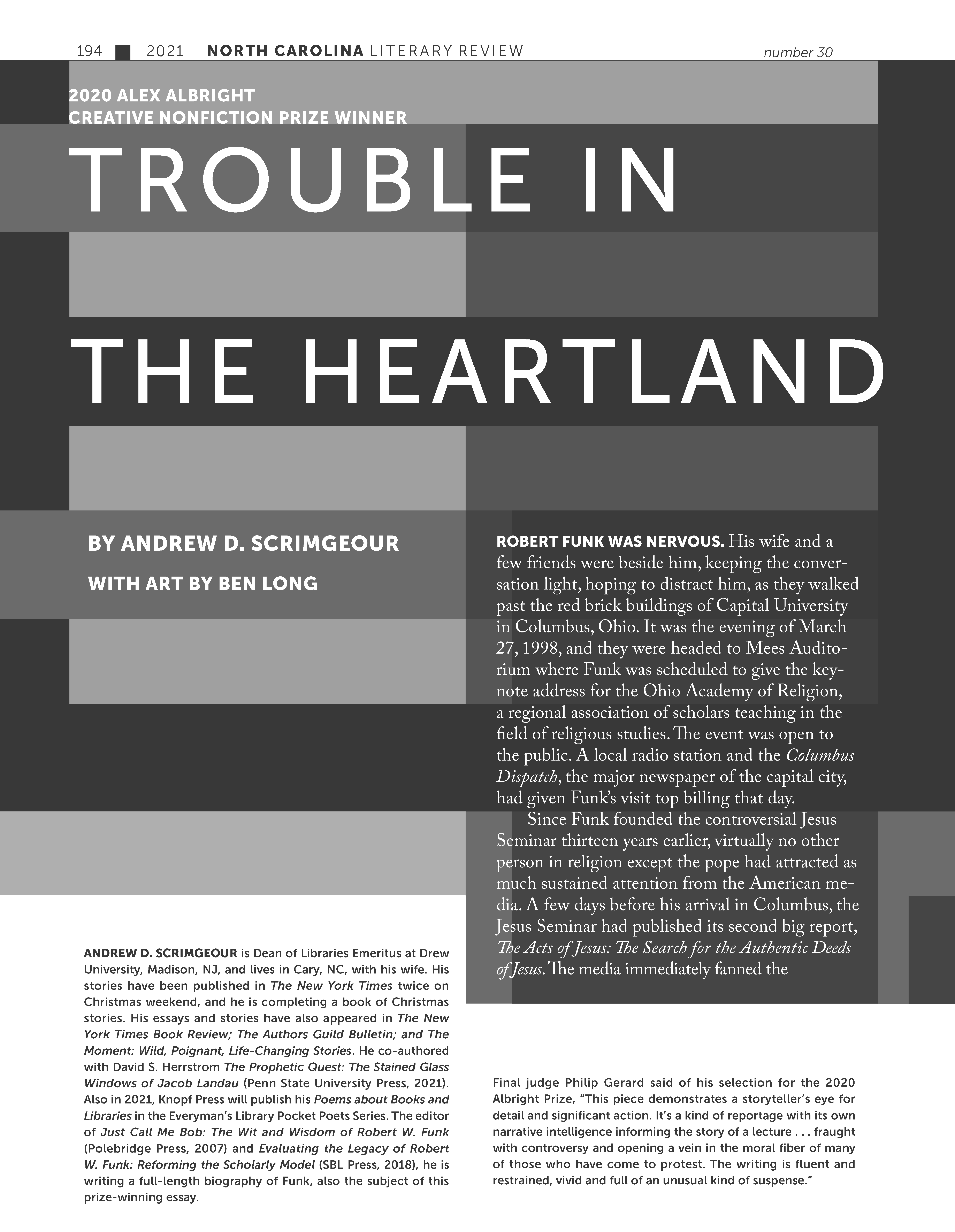Friday from the Archives: “Trouble in the Heartland” 2020 Alex Albright Creative Nonfiction Prize essay by Andrew D. Scrimgeour from NCLR 30 (2021)
We’re almost at the 2025 Alex Albright Creative Nonfiction Prize Contest! The submission window opens January 15th, so polish those creative nonfiction pieces and get ready to submit! As inspiration, here’s an excerpt from Andrew Scrimgeour’s award-winning piece from 2020. Set in 1998, it reads presciently current day.
“So Funk began: “The quest of the historical Jesus is the pursuit of the discrepancy between the historical figure and the portraits of him in the gospels. The problem is to distinguish fact from fiction in the twenty-two ancient gospels that contain reports about what he said and did.” Funk could hear some in the audience gasp as they heard the word “fiction” and learned, possibly for the first time, that many more gospels than Matthew, Mark, Luke, and John were revered by the early Christian communities. Nonetheless, he pressed on. “The quest is essentially a search for reliable data. The popular view is that Jesus did and said everything that is reported of him in the four New Testament gospels. After more than two centuries of critical work, we know that is not true: The New Testament gospels are a mixture of folk memories and creative storytelling; there is very little hard history.”
Before he could continue, a middle-aged man seated near the front jumped to his feet. “Stop!” he cried. “I can’t allow you to do this!” Immediately the police officers stiffened, hands on their holsters. “I’ve been praying all day what to do, and God told me I had to stop you from speaking,” he said. Clutching a large Bible, he launched into a divinely ordained filibuster, passionately quoting Scripture, verse after verse. Like-minded partisans, particularly those who sat in the front rows of the balcony that partially ringed the hall, applauded and roared their approval. When the man refused to take his seat, the police moved to his row and, as the crowd booed, escorted him out of the auditorium. When order was restored, Funk worked hard to regain both his composure and the attention of his audience.
Fifty minutes later, he completed his talk and said, “If you have questions or comments about anything I’ve said, I’d be happy to hear them.” Immediately there was a rush to the microphones that were stationed in the main aisles. But hope for thoughtful conversation quickly evaporated, as it became apparent that the protestors had outmaneuvered the university and seminary students who wanted to seriously engage with Funk. The protestors now outnumbered them in the lineup at the microphones. While there were some questions from people who wanted to understand the approach of the Jesus Seminar, they were in the minority. Squinting through the harsh lights of the stage to locate his inquisitors, Funk responded thoughtfully to each comment or question, but as one person reported, “Funk was repeatedly told he was possessed by a demon and that he was going to hell.” Nevertheless, throughout the ordeal, “he tried calmly to identify himself as a historian, as a scholar, as a seeker after truth, as one who simply wanted to discover what could be known. But people booed, tried to shout him down. He almost lost his temper, twice, but only almost.”
Read the entire article on ProQuest or purchase a copy of the 2021 issue.
